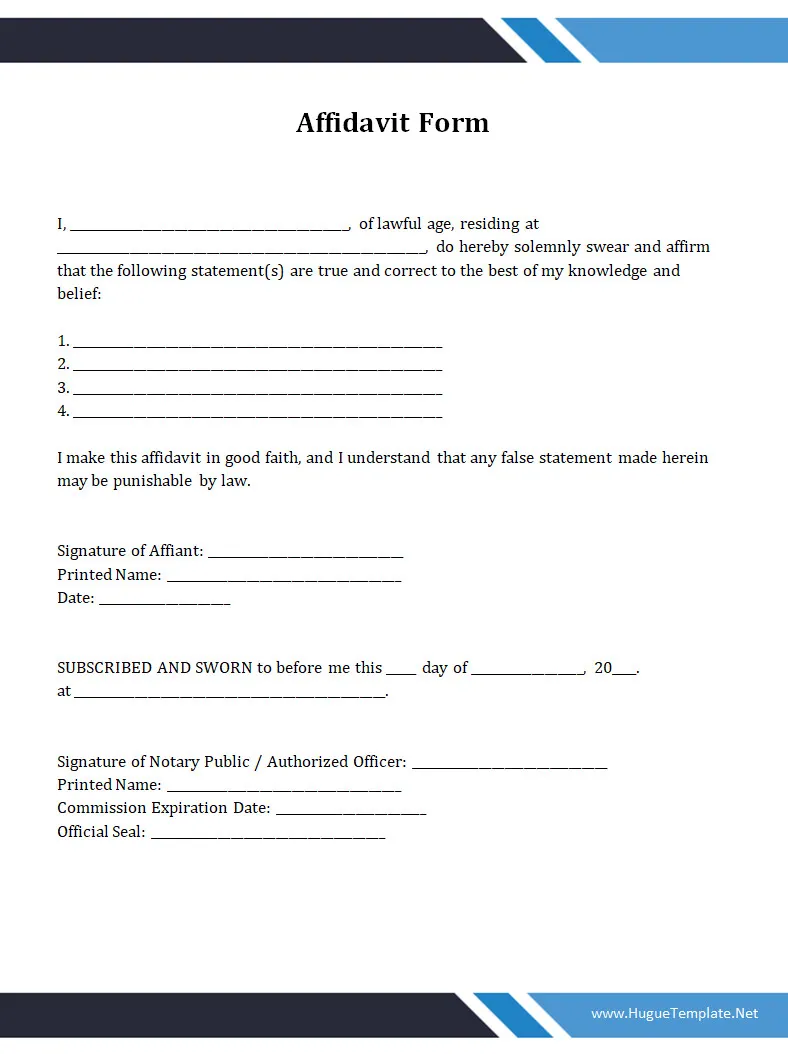Regarding legal matters, having a written statement of facts that is sworn to be true can be crucial. This is where an affidavit form comes into play.

An affidavit is a written document in which an individual presents their testimony in writing, under oath, and typically signed in the presence of a notary public or a justice of the peace. This document is used as evidence in various legal or administrative proceedings to support a case or claim. Affidavit forms are commonly used to save time, streamline court cases, and ensure that the contents of the statement are true and accurate.
What is an Affidavit Form?
An affidavit form is a legal document that allows an individual to provide a written, sworn statement of fact that can be used as evidence in court. This document is typically used in legal proceedings to present testimony in writing, rather than through oral testimony.
The person making the statement must swear or affirm that the contents of the affidavit are true and accurate to the best of their knowledge. Affidavit forms are often signed in the presence of a notary public or a justice of the peace to verify the identity of the affiant and ensure the document’s authenticity.
The Purpose of an Affidavit Form
An affidavit form serves as a way for individuals to present their version of the facts in a legal matter. It allows individuals to provide a written account of events, circumstances, or information that is relevant to a case.
By swearing that the contents of the affidavit are true, the affiant is attesting to the accuracy and credibility of the information presented in the document. This sworn statement can then be used as evidence to support a legal claim, provide information to a court, or assist in an investigation.
Types of Affidavit Forms
Various types of affidavit forms are used in different legal contexts. Some common types of affidavit forms include:
- Sworn Affidavit: An affidavit is a written statement in which the affiant swears that the information provided is true and accurate.
- Financial Affidavit: A financial affidavit is used to disclose financial information, assets, and liabilities in legal matters such as divorce or bankruptcy.
- Witness Affidavit: A witness affidavit is a statement provided by a witness to a legal proceeding, outlining their observations or knowledge of the events in question.
- Support Affidavit: A support affidavit is used to declare financial support or sponsorship for an individual in various immigration or visa-related matters.
Why Use an Affidavit Form?
There are several reasons why individuals may choose to use an affidavit form in legal proceedings. One of the main reasons is to provide a written account of events or information that can be used as evidence in court. By swearing that the contents of the affidavit are true and accurate, the affiant is presenting a legally binding statement that can support their case or claim.
Affidavit forms are also used to save time and make court cases more efficient by eliminating the need for extensive oral testimony. Additionally, the requirement for the affiant to sign the affidavit in the presence of an authorised witness adds an extra layer of credibility and authentication to the document.
Common Uses of Affidavit Forms
Affidavit forms are commonly used in a variety of legal and administrative proceedings. Some common uses of affidavit forms include:
- Legal Proceedings: Affidavit forms are used to present evidence and information in court cases, both civil and criminal.
- Family Law Matters: Affidavit forms are often used in divorce, custody, and child support cases to provide statements of fact.
- Immigration Cases: Affidavit forms are used to support visa applications, sponsorship requests, and other immigration-related matters.
- Probate Proceedings: Affidavit forms may be used to declare the validity of a will or provide information about an estate.
Best Practices for Creating an Affidavit Form
When creating an affidavit form, it is important to follow best practices to ensure its validity and effectiveness. Some best practices for creating an affidavit form include:
- Be Truthful: Always swear or affirm that the contents of the affidavit are true and accurate to the best of your knowledge.
- Include Specific Details: Provide specific dates, times, and details to support your statements and make your affidavit more credible.
- Avoid Speculation: Stick to the facts and avoid including opinions, speculation, or hearsay in your affidavit.
- Follow Legal Procedures: Adhere to all legal requirements for creating and signing an affidavit to ensure its admissibility in court.
Affidavit Form Template
An Affidavit Form provides a clear and structured way to create a sworn written statement for legal, personal, or business matters. It ensures all required elements—such as the declarant’s information, statement of facts, and notarization section—are properly included, helping you avoid errors and maintain legal validity. Using a template saves time, adds professionalism, and helps you confidently prepare an affidavit that meets formal requirements.
Download our Affidavit Form Template today to create accurate, legally compliant affidavits with ease.
Affidavit Form Template – DOWNLOAD